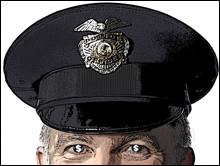
Last year, the BPD’s homicide department spent more than $1 million on overtime — and left three-quarters of the city’s murders unsolved.
|
The problems Haunting the Boston Police Department’s (BPD) homicide unit — low arrest rates, cases rejected by juries, and exonerations of wrongfully convicted men — did not occur in a vacuum. They were nurtured by neglect and grew because the top command in the department provided little or no oversight of the supposedly elite unit, particularly during commissioner Paul Evans’s long tenure, which ended in late 2003. The BPD’s apparent reluctance to hold the homicide unit accountable was exposed in federal court last month, when a jury found that Evans wrongly fired police captain William Broderick in retaliation for, among other things, blowing the whistle on an overtime scam — which Broderick called “an open ATM machine” for homicide detectives.
Overtime-abuse scandals have long dogged the department, and continue to do so under Evans’s successor, Kathleen O’Toole, who began actively tracking overtime hours last September. A year earlier, O’Toole had hired a budget chief to eliminate, in her own words, “overcharges and abuses.” That came on the heels of a Boston Globe report finding numerous instances of officers apparently getting paid overtime for details they didn’t actually work — in some cases, getting paid for two details in separate places at the same time — and after Commissioner O’Toole removed her own appointee, District B3 captain John Kervin, reportedly for funneling hundreds of thousands of dollars in overtime to himself and his staff.
But back in 2001, when Broderick alerted top department officials — including Evans — to apparent overtime abuses by homicide and drug-control detectives, they did little or nothing to determine if fraud had taken place, as their own testimony makes clear. Broderick testified that one superintendent’s response was, “Is there any way that we can keep it under the radar?” Nobody was disciplined, other than Broderick.
According to Broderick, who served as the court supervisor in 2001 and 2002, detectives in the homicide and drug-control units racked up hours of overtime for appearances at Suffolk Superior Court — appearances that were at best unverified, at worst fraudulent. Documents in the court case, including copies of overtime cards, appear to back up those allegations.
So did the BPD’s own internal review, spurred by Broderick’s allegations, which found that during a six-month period, homicide and drug-control officers had submitted more than 200 overtime slips signed by someone other than the proper supervisor to certify the start and end times of their court appearances. For more than 80 percent of those, the officer had never signed in on the courthouse log sheet, which every officer is supposed to do upon entering the courthouse.
Once Broderick started demanding evidence that the detectives were actually in court for legitimate purposes, it seemed that much of the need for these court appearances vanished. The homicide detectives’ court-overtime earnings plunged by about half within two years, from $175,000 in 2000, to $116,000 in 2001, to $88,000 in 2002. By last year, that figure was less than $42,000, despite the high murder count and a special Superior Court session for homicide trials.
But this result — and the success of Broderick’s suit — does not mean there’s been real resolution of the broader problem vexing the department: nobody is ensuring that homicide detectives are using their time wisely, properly, and effectively. The homicide unit’s total overtime pay has risen sharply, while its arrest rate remains one of the lowest in the country — and is getting worse. Last year, the unit spent more than $1 million on overtime and left three-quarters of murders unsolved. Is anyone in the department demanding that the money be better spent? It certainly doesn’t seem so.
Watching the Detectives
Without question, Boston’s homicide detectives put in many, many hours — legitimately — at Superior Court. In addition to serving at trials, they appear for grand-jury testimony on their cases, and they also track down and escort witnesses.
Homicide detectives on the late shift — the ones who get the bulk of the cases — work from 4 pm to 1 am. Oftentimes, they clock in after spending eight hours of overtime in the courthouse. “At four o’clock I’m in the twilight of my day, and these guys have to show up to Schroeder Plaza,” former prosecutor Timothy Bradl tells the Phoenix. Bradl recently left the Suffolk County District Attorney’s office, where he prosecuted homicides for the past three years. “Then at the end of their shift, someone’s going to get shot, and they’ll be there until four in the morning.”